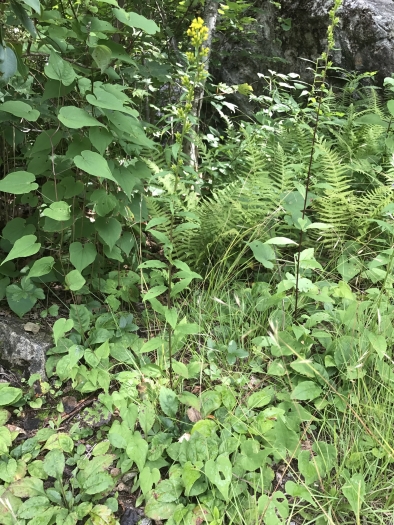Roan Mountain Goldenrod
(Solidago roanensis)
Roan Mountain Goldenrod (Solidago roanensis)
/
/

By Alan Weakley no rights reserved
Public Domain
Image By:
By Alan Weakley no rights reserved
Recorded By:
Copyright:
Public Domain
Copyright Notice:
Photo by: By Alan Weakley no rights reserved | License Type: Public Domain | License URL: http://creativecommons.org/publicdomain/zero/1.0/ | Uploader: whiteoak | Publisher: iNaturalist |





Estimated Native Range
Summary
Solidago roanensis, commonly known as Roan Mountain Goldenrod, is a deciduous perennial herb native to the high-elevation grassy balds and spruce-fir forests of the Southern Appalachian Mountains, particularly in the Southeastern USA. It typically grows up to 100 cm (40 inches) tall and spreads through a branching underground caudex. The plant is characterized by its erect stems and narrow, lanceolate leaves. During the summer and fall, Roan Mountain Goldenrod produces numerous small, bright yellow flower heads, each arranged in a dense, elongated cluster that is highly attractive to pollinators.
This species is valued for its vibrant yellow flowers that add color to the garden late in the growing season. It is often used in wildflower gardens, native plant landscapes, and for naturalizing in meadows. Roan Mountain Goldenrod is relatively low maintenance, tolerating a range of soil conditions, though it prefers well-drained soils. It is drought-tolerant once established and thrives in full sun to part shade. While generally disease-free, it can occasionally suffer from rust or mildew in overly moist conditions. Gardeners should be aware that some goldenrod species can be aggressive spreaders, but Solidago roanensis is not typically invasive.CC BY-SA 4.0
This species is valued for its vibrant yellow flowers that add color to the garden late in the growing season. It is often used in wildflower gardens, native plant landscapes, and for naturalizing in meadows. Roan Mountain Goldenrod is relatively low maintenance, tolerating a range of soil conditions, though it prefers well-drained soils. It is drought-tolerant once established and thrives in full sun to part shade. While generally disease-free, it can occasionally suffer from rust or mildew in overly moist conditions. Gardeners should be aware that some goldenrod species can be aggressive spreaders, but Solidago roanensis is not typically invasive.CC BY-SA 4.0
Plant Description
- Plant Type: Herb
- Height: 2-5 feet
- Width: 1-3 feet
- Growth Rate: Moderate
- Flower Color: Yellow
- Flowering Season: Summer, Fall
- Leaf Retention: Deciduous
Growth Requirements
- Sun: Full Sun, Part Shade
- Water: Medium, High
- Drainage: Medium, Fast
Common Uses
Bee Garden, Bird Garden, Butterfly Garden, Deer Resistant, Hummingbird Garden, Low Maintenance, Rabbit Resistant, Showy Flowers
Natural Habitat
High-elevation grassy balds and spruce-fir forests of the Southern Appalachian Mountains
Other Names
Common Names: Shadowy Goldenrod
Scientific Names: , Solidago roanensis, Solidago roanensis var. monticola, Solidago monticola, Solidago maxonii, Aster monticola, Solidago alleghaniensis, Solidago curtisii var. monticola, Solidago roanensis var. roanensis,
GBIF Accepted Name: Solidago roanensis Porter